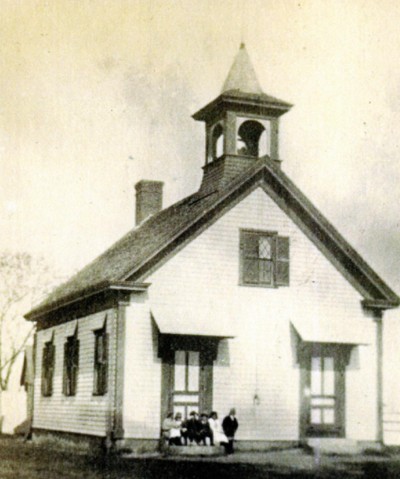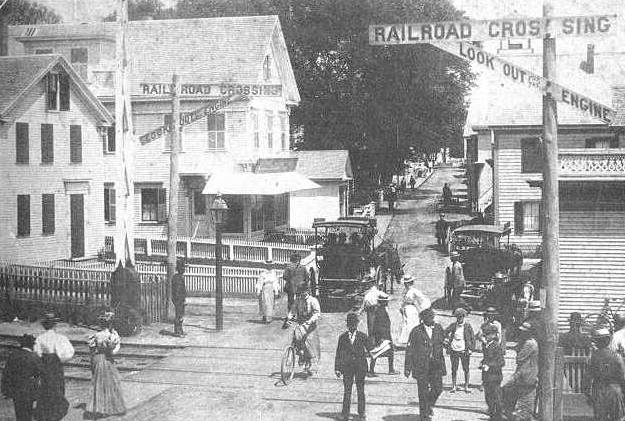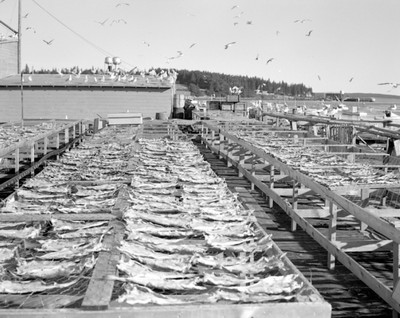A Wash Ashore
Chapter 4

The Schoolhouse
Our school’s eighth-grade class was small, with only five members. Grades five through eight were in one room, so Josiah, as a sixth grader, was also in the room. The younger children were all in another room. Sometimes, if the teacher was busy, one of the older students would help a fifth or sixth grader, but usually we kept to ourselves. During recess we often played with the seventh graders, nine in number, so we’d have enough to make two teams for whatever game we chose.
In the spring, when the snow had melted, Josiah and I again took to walking along the beach on days we had no school and weren’t needed in the store. Sometimes we picked up pieces of flotsam or jetsam like driftwood or old bottles. Father was usually able to sell our finds in his store, providing us with a little extra money. Grinning, Josiah observed one day that he was a piece of flotsam.
When it was warm enough, we sometimes lay among the dunes, more or less hidden from land and the beach. There we hugged each other and kissed passionately, continuing to share our mouths and tongues.
School ended in June. I was now officially a school graduate. Josiah had another two years to go. Father was able to hire us both for the summer, saying that he would still employ me in the fall. We enjoyed working in the store, and I learned in time that Josiah had a fine sense of humor. Sometimes he played little practical jokes on me. Other times his humor came out in puns or other things he said.
Sunday mornings we went to church. Since the store was never open on Sundays, Josiah and I continued our walks along the beach in the afternoons. Usually on those afternoons we only wore cutoff trousers.
One Sunday, when the minister had spoken of sinning as he often did, Josiah asked, “Do you think that what we do in bed is a sin?”
I thought for a while before saying, “Why would God make such a pleasurable gift to us a sin?”
We discussed it for some time. Weren’t some sins, like gluttony and fornication, also pleasurable? Since there was nobody we could ask, we thought maybe it was a sin and we should stop what we were doing. But at night in bed, any thoughts of sinning were overcome by the pleasures we felt, so we gave in to them.
Another Sunday afternoon, we were lying in the dunes. Josiah reached over and kissed me. From there we moved to our usual stroking, kissing, and licking each other’s bodies, giving special attention to our nipples.
As we grew more excited, I slipped my hand up the leg of his shorts and began rubbing the inside of his thigh. He groaned with pleasure.
In no time, we were naked and sucking each other. As always, we were loving the sensations and, as our excitement rose, we naturally lifted our butts off the ground and cried out, shooting copious wads of cum.
Just as we came down from our high, we heard a gasp. Looking over, we saw Edwin, who was standing with a look of shocked amazement on his face.
“I’m telling!” he said and began to turn away.
“Eddie, come here,” I called, but he was gone.
“Do you think we’ll get in trouble?” Josiah asked.
“I’m sure of it,” I replied.
As we cleaned ourselves off and put on our pants Josiah began to cry asking, “Do you think our parents will throw me out?”
“If they do, they’ll be throwing me out as well,” I said. “Wherever you go, I’m going.”
We heard Father calling from the house.
“Uh-oh,” I said, and we trudged through the sand towards the house.
When we arrived at the house, Father, all six feet and two inches of him, was standing outside the kitchen door looking very stern. He told us what Eddie had reported and asked if it was true.
Looking down at the ground, we both nodded.
“Look at me when I talk to you,” he said.
We looked up and I said, “Yes, sir.”
“Was this the first time you had done this?” he asked.
Not wanting to get into details, I answered, “No, sir.”
“I will not allow this to continue in my family,” he said. “Either you stop this vile perversity, or you leave. Do I make myself clear?”
“Yes, sir,” we responded in unison.
He dismissed us and we walked back to the beach.
“What can we do?” I asked.
“I guess we have to stop,” Josiah replied, “but I don’t know if I can.”
“Me either.”
“Well, let’s try to stop and see what happens,” he said. “After all, we never really tried when we wondered if it was a sin.”
The next few nights, as Josiah and I lay back-to-back in bed together, we managed to leave each other alone. I returned to beating off in the privy, leaving Josiah to do it in the bed. It was so difficult. We had found a kind of heaven together and had to give it up.
I was very angry with Eddie, and he knew it. My anger brought turmoil to the family. Father ordered me to stop blaming my brother, saying he did just what he should have done.
After a week, as we lay in bed, Josiah said quietly, “Caleb, I can’t do this. The temptation is too strong.”
In the morning, we spoke to Father. “You just have to keep away from each other,” he said.
“How can we do that when we sleep in the same bed?” I asked.
Father said he’d put a bed in the shed and one of us could sleep there.
When it came time to choose which of us would sleep in the shed, I said I would; Josiah said he would. The little building was almost unbearably hot in the summer and unheated in the winter. We drew cards for it, and I wound up in the shed. Josiah suggested that we alternate, maybe a week at a time, and that’s what we ended up doing.
We passed the summer alternating and missing each other terribly. The only good thing about it was that we could each satisfy ourselves in bed again.
In the fall I continued in Father’s store while Josiah returned to school.
We did manage to keep our hands off each other, only walking hand in hand on the beach and occasionally kissing when there was nobody around.
++++++++
Winter came. A lot of snow fell that winter accompanied by plenty of high winds and cold. The wind penetrated cracks in the shed and the temperatures were often below freezing.
I lay shivering in the shed one night even though I was wrapped in all the blankets I could find and was sleeping in my clothes. The wind was howling like a banshee, and I wondered momentarily if it meant someone in the family would die. I had heard tales of banshees whose presence meant a death.
When I couldn’t stand it any longer, I climbed out of bed, put on my boots, and wrapped my blankets around me. As I went out of the shed, the wind tore the door open. The house was only about fifty feet from the shed, but in the blowing snow it was invisible. The gale was blowing the snow in twists and corkscrews into my face, which immediately grew stiff and felt frozen. As I leaned into the wind and tried to walk, I felt I was making no progress at all, but at last I saw the house emerge through the swirling snow and in a few more steps, I reached the kitchen door.
In the kitchen, I was thankful that the stove was putting out heat. My face was hurting. I sat close to the stove, still with my clothes on and the blankets around me. As I warmed up, I laid my head on the table.
Mother and Father came into the kitchen in the morning and found me fast asleep, still with my head on the table.
Without waking me, they went into the living room and began to argue. I awoke as the argument was heating up. Listening, I heard that Mother wanted to give in while Father refused.
At last Mother asked, “Well, could he sleep on the floor in here? If he stays in the shed, one of these nights he’ll die.” Reluctantly, Father agreed.
From then on, Josiah and I alternated sleeping on the floor in the living room. There wasn’t room to move a mattress in, but Josiah and I eventually got used to the floor.
We managed that arrangement through the winter, but we were both growing increasingly unhappy, and my parents were aware of it.
One day in the spring, Edwin came to us and said, “I’m so sorry I told on you. I didn’t think it would lead to this. I know you’re both unhappy and I don’t know what to do about it.”
“There’s nothing you can do,” Josiah replied gently. “This really wasn’t your fault, and I suppose at some point they would have figured us out. Don’t torture yourself over it.”
I quickly agreed, adding, “It’s our problem and we’ll need to solve it.” Eddie hugged us both before he left.
Two days later, as we were walking on the beach, we talked about how unhappy we were and about how we were tearing the family apart.
“Father said if we didn’t stop, we had to leave,” I said. “Maybe that’s what we should do. I’ve finished school, we both have some experience with working, so we should be able to get jobs at least for the summer.”
“Does that mean I’ll have to stop school?”
“Probably not,” I said, “unless you want to.”
“I don’t unless I have to. I want to finish if I can.”
We tried to talk with our parents about our idea in the morning. They wouldn’t hear of it. Father said we were not to leave. We just had to try harder to make everything work and to be happy.
We did try. We really did. But in the end, it just wasn’t working, and we decided we had to leave, regardless of what Father said.
“Where should we go?” Josiah asked.
“Well, I guess we have two choices. Either we go south towards Chatham or north towards Provincetown.”
I had seen Chatham several times but had never been out to Provincetown. Josiah had no preference, so we decided to head north, towards the end of the Cape. We estimated that walking would take us about two or three days. There was a railroad which had been extended the entire length of the Cape, but we were in no hurry, so we decided to save our money and walk.
We packed what we could in blanket rolls along with money we had saved from working. I wrote a note to my parents and Edwin, leaving it on the kitchen table.
At about one o’clock in the morning, we crept out of the house and walked to the road, where we turned north.
It was a beautiful night. There was a half-moon and the stars shone brightly. We were in high spirits as we trudged along. Sure we were sad to leave our family, but we were looking forward to our adventure.
Roads which carts, carriages, and stagecoaches used at that time weren’t usually paved and were only packed dirt and sand.
We walked through the night and into the morning. Then we realized we hadn’t brought any food or water.
“How stupid can we be?” Josiah asked as we both laughed.
We stopped at a farmhouse and asked to buy food, but the woman there fed us without accepting any money.
“Headed towards Provincetown?” she asked as we ate porridge and toast.
“Yes, ma’am,” I replied.
“Running away?” she asked.
Josiah and I looked at each other.
“Well, sort of,” he said, “but not really.”
She asked him what he meant, and he simply said that our father had told us to leave. It wasn’t really the truth, of course, but it was all he could come up with quickly.
As we prepared to depart, the woman gave us more food and two bottles which she filled with water.
We walked the rest of the day and spent the night sleeping in the dunes. The wind came up during the night and we awoke in the morning covered with sand.
Laughing, we worked our way free, ate the last of our food, and headed towards Provincetown.
The Cape curves westward towards the tip, so we could see our destination across the bay long before we arrived there.
We walked into town a little before dusk.
Provincetown had two main roads, both heading east to west. Because of the way the Cape curved, when we thought we were heading west, we were really going east. The road near the harbor was named Commercial Street, while the other, running parallel a couple of blocks away, was called Bradford Street.

Commercial Street
Walking along Commercial Street, which had a raised wooden walkway along one side so people could stay out of the mud, we realized that many of the people who were talking weren’t speaking English. This was something we hadn’t anticipated.
Speaking pig Latin, which we had played with at home much to Eddie’s disgust, Josiah said, “Utwha oday oya inkthay ethay rhay ingsay?”
We laughed as we continued down the street speaking igpay atinlay.
After a time, we heard a couple of men speaking English, so we stopped to talk with them.
They told us that the language we were hearing was Portuguese and was being spoken by men and their families, most of whom had come from the Azores or the Cape Verde Islands for the fishing, although some had come earlier as crew on whaling ships.
We asked them if they knew of any place where we could rent a room cheaply. One of the men, Mac Trumble, offered a room in his house on a side road off Bradford Street. He walked us there and showed us the room. It wasn’t a large room, but he told us we could also use the kitchen when his family wasn’t using it. Then he told us how much it would be for a month. Fortunately, we had enough money for the first month.
We asked him if he knew where two strong boys could get jobs. After we told him about being employed in the store, he mentioned a couple of stores we might try but also suggested we try along the docks.
Thanking him, we left our belongings in the room and made our way back towards Commercial Street. There were a number of stores along the street and the wharves, a few of them chandleries, but nobody seemed to need any help.
We found a pub where we could eat cheaply before returning to our room. Undressing, we climbed into bed. It sank towards the middle, but that was fine with us, as we wanted to be touching. There, we loved each other passionately but we were both exhausted, so we soon dropped off to sleep.
There were some fifty wharves in Provincetown Harbor in the late 1880s, although some were no longer being used and were falling apart. Walking along the street and out on some of the wharves, we managed to find work helping to process some of the tons of fish which were unloaded from the ships. Most were cod but there was also some mackerel. We were working with cod, for which we were grateful. The mackerel were both slipperier and smellier.

Fish Flakes
The cod had been cut, gutted, and salted on the boats, so they wouldn’t spoil as the boats usually stayed out for several days. When the fish were landed, we helped wash them, resalt them, and carry them in barrows to the fish flakes, which were long racks on the beaches.
There, the fish would dry. We placed the fish head-to-taiI on the flakes. After a few days, the drying fish had to be turned over. It was physical work with long hours and no rest, but it was all we could find.
We set to work with a will that day. By quitting time, around 6 PM, we were exhausted and stinking. Fortunately for us, the Trumbles’ house had an outside shower.
We stripped down to our undershorts and stood, reveling in the cold water pouring over us until we felt clean. Unsure what to do with our clothes, we left them by the shower, and went into the house.
Mrs. Trumble, the lady of the house, was in the kitchen. She suggested we bring the clothes in, and for a small fee, she would wash them. We gratefully accepted.
Dressed again in clothes we had brought with us from home, we ventured out to find food, settling on our same pub, where we knew the food was tasty and inexpensive. As we sat eating, we listened to the chatter around us, most of it in Portuguese, and congratulated ourselves on our successes so far.
Back in our room, we quickly undressed and climbed into the bed. We lay facing each other, kissing and stroking, and trying to make up for all the time we had missed. It was an exhausting night but a glorious one. We slept little and loved much.